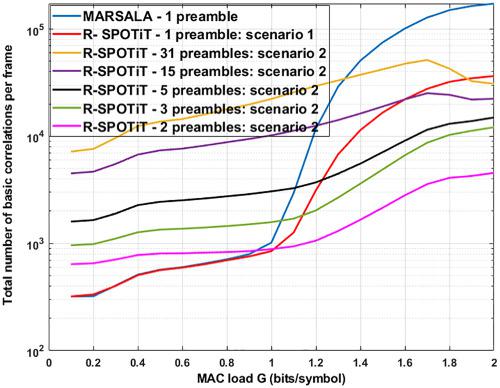当前位置:
X-MOL 学术
›
Int. J. Satell. Commun. Netw.
›
论文详情
Our official English website, www.x-mol.net, welcomes your
feedback! (Note: you will need to create a separate account there.)
Complexity analysis for recent ALOHA random access techniques in satellite communications
International Journal of Satellite Communications and Networking ( IF 0.9 ) Pub Date : 2020-08-23 , DOI: 10.1002/sat.1370 Selma Zamoum 1, 2 , Jérôme Lacan 3 , Marie‐Laure Boucheret 2 , Jean‐Baptiste Dupe 4 , Mathieu Gineste 5
International Journal of Satellite Communications and Networking ( IF 0.9 ) Pub Date : 2020-08-23 , DOI: 10.1002/sat.1370 Selma Zamoum 1, 2 , Jérôme Lacan 3 , Marie‐Laure Boucheret 2 , Jean‐Baptiste Dupe 4 , Mathieu Gineste 5
Affiliation

|
In this paper, we study the the complexity of packet localization at reception, for recent synchronous Random Access (RA) techniques based on the protocol ALOHA for satellite communications. The promising CRDSA (Contention Resolution Diversity Slotted ALOHA) offers better throughput, in comparison to the traditional slotted ALOHA protocols, thanks to the use of Successive Interference Cancellation (SIC) along with multireplica transmission. MARSALA (Multi‐replicA decoding using corRelation baSed locALizAtion) is one of the many variants and enhancement schemes of CRDSA that have been proposed in the literature. It is applied to CRDSA each time a decoding deadlock situation is reached (when no packets can be retrieved by CRDSA). MARSALA first localizes the replicas of collided packets on a chosen reference time slot using correlations. Then it performs coherent signal combination of packet replicas prior to decoding. However, despite the good performance offered by MARSALA, its localization process adds a significant complexity to the receiver in terms of correlation operations. R‐SPOTiT (Random Shared POsition Technique for Interfered random Transmissions) mitigates this complexity by introducing a shared information between the receiver and each of the transmitters, about all potential packets' locations on the frame, without any additional signaling overhead. We focus in this paper on the analysis of the total number of correlations which are needed to localize packets' replicas for both MARSALA and R‐SPOTiT, with a single or with multiple Gold preambles. This should include preamble detection operations that are performed at CRDSA with a coarse and fine tracking. The results show that the most suitable system to use is the multi‐preamble R‐SPOTiT with two preambles.
中文翻译:

卫星通信中最新ALOHA随机接入技术的复杂性分析
在本文中,我们针对基于卫星通信的ALOHA协议的最新同步随机访问(RA)技术,研究了接收时数据包本地化的复杂性。与传统的时隙式ALOHA协议相比,有前途的CRDSA(竞争解决方案分集式时隙ALOHA)提供了更高的吞吐量,这要归功于使用了连续干扰消除(SIC)和多副本传输。MARSALA(使用相关基础定位的多副本解码)是文献中提出的CRDSA的众多变体和增强方案之一。每当达到解码死锁情况时(当CRDSA无法检索到数据包时),它将应用于CRDSA。MARSALA首先使用相关性在选定的参考时隙上定位冲突数据包的副本。然后,它在解码之前执行数据包副本的相干信号组合。但是,尽管MARSALA提供了良好的性能,但其定位过程在相关运算方面给接收机增加了相当大的复杂性。R‐SPOTiT(用于干扰随机传输的随机共享位置技术)通过在接收器和每个发送器之间引入共享信息,从而减轻了此复杂性,该信息涉及帧上所有潜在数据包的位置,而没有任何额外的信令开销。在本文中,我们着重于分析使用单个或多个Gold前同步码定位MARSALA和R-SPOTiT的数据包副本所需的相关总数。这应该包括在CRDSA进行的具有粗略和精细跟踪的前同步码检测操作。
更新日期:2020-08-23
中文翻译:

卫星通信中最新ALOHA随机接入技术的复杂性分析
在本文中,我们针对基于卫星通信的ALOHA协议的最新同步随机访问(RA)技术,研究了接收时数据包本地化的复杂性。与传统的时隙式ALOHA协议相比,有前途的CRDSA(竞争解决方案分集式时隙ALOHA)提供了更高的吞吐量,这要归功于使用了连续干扰消除(SIC)和多副本传输。MARSALA(使用相关基础定位的多副本解码)是文献中提出的CRDSA的众多变体和增强方案之一。每当达到解码死锁情况时(当CRDSA无法检索到数据包时),它将应用于CRDSA。MARSALA首先使用相关性在选定的参考时隙上定位冲突数据包的副本。然后,它在解码之前执行数据包副本的相干信号组合。但是,尽管MARSALA提供了良好的性能,但其定位过程在相关运算方面给接收机增加了相当大的复杂性。R‐SPOTiT(用于干扰随机传输的随机共享位置技术)通过在接收器和每个发送器之间引入共享信息,从而减轻了此复杂性,该信息涉及帧上所有潜在数据包的位置,而没有任何额外的信令开销。在本文中,我们着重于分析使用单个或多个Gold前同步码定位MARSALA和R-SPOTiT的数据包副本所需的相关总数。这应该包括在CRDSA进行的具有粗略和精细跟踪的前同步码检测操作。











































 京公网安备 11010802027423号
京公网安备 11010802027423号